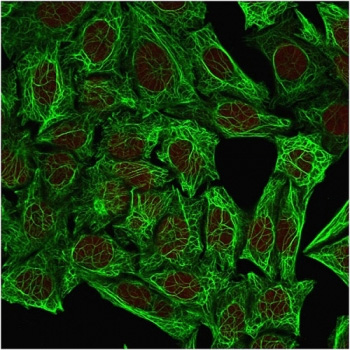- Tel: 858.663.9055
 Email: info@nsjbio.com
Email: info@nsjbio.com
- Tel: 858.663.9055
- Email: info@nsjbio.com
KRT7 Antibody detects keratin 7, a type II intermediate filament protein expressed in simple glandular and transitional epithelia. KRT7 is found in tissues such as the lung, breast, endometrium, urinary tract, and bile ducts, where it contributes to structural integrity and epithelial resilience. KRT7 forms heterodimers with keratin 19, playing a central role in cytoskeletal stability and cellular signaling.
KRT7 expression is widely used in diagnostic pathology. It is often paired with keratin 20 staining (KRT7+/KRT20− vs. KRT7−/KRT20+) to help distinguish tumor origins, particularly in adenocarcinomas of lung, breast, ovary, and endometrium compared with colorectal cancers. The KRT7 Antibody therefore serves as both a research reagent and a diagnostic marker with significant clinical utility.
Because altered keratin 7 expression is linked to carcinomas, inflammatory disease, and tissue remodeling, Keratin 7 Antibody reagents are applied across oncology, pathology, and translational research.
NSJ Bioreagents offers KRT7 Antibodies validated for immunohistochemistry, immunofluorescence, western blotting, ELISA, and flow cytometry. Each KRT7 Antibody undergoes rigorous testing to confirm specificity for keratin 7 and minimize cross-reactivity with related keratins.
By choosing a KRT7 Antibody from NSJ Bioreagents, scientists gain high-quality reagents optimized for reproducibility. Our antibodies provide sharp, specific staining in tissue sections, reliable protein detection in lysates, and consistent results across applications. With detailed datasheets, recommended controls, and validated protocols, NSJ Bioreagents ensures that Keratin 7 Antibody products deliver clarity and confidence in both research and diagnostic settings.
The KRT7 Antibody has broad utility across epithelial biology and clinical pathology.
KRT7 Antibodies identify simple epithelia in lung, breast, and endometrium.
The KRT7 Antibody supports studies of epithelial differentiation and polarity.
Keratin 7 Antibody reagents help analyze cytoskeletal dynamics and epithelial signaling.
KRT7 Antibodies are critical in immunohistochemical panels for adenocarcinoma diagnosis.
The KRT7 Antibody distinguishes tumors of lung, breast, or ovary from colorectal cancer.
Keratin 7 Antibody tools support biomarker discovery for prognosis and therapy response.
KRT7 Antibodies detect keratin changes during chronic inflammation.
The KRT7 Antibody is used to evaluate epithelial remodeling in fibrosis and injury.
Keratin 7 Antibody reagents help clarify epithelial–immune interactions.
KRT7 Antibodies track epithelial lineage commitment during development.
The KRT7 Antibody is used to study stem cell differentiation into epithelial tissues.
KRT7 Antibodies validate epithelial identity in engineered tissues.
The KRT7 Antibody supports translational research on epithelial repair and grafting.
KRT7 Antibodies validate biomarkers used in diagnostic pathology.
The KRT7 Antibody is applied in clinical research linking keratin expression to therapy outcomes.
Keratin 7 Antibody reagents support precision oncology approaches.
Keratin 7 is an important epithelial marker with significant diagnostic and biological relevance. The KRT7 Antibody provides researchers and clinicians with a precise tool for detection, while Keratin 7 Antibody reagents more broadly support progress in oncology, pathology, and regenerative medicine.
In diagnostic pathology, KRT7 Antibodies are indispensable for classifying carcinomas. In basic biology, the KRT7 Antibody clarifies epithelial differentiation and cytoskeletal function. In oncology, Keratin 7 Antibody tools support biomarker development and therapy guidance.
Clinically, KRT7 immunostaining remains a cornerstone of cancer diagnosis, particularly when used in combination with other keratins. The KRT7 Antibody ensures accuracy in these evaluations, bridging molecular insights with patient care and improving diagnostic precision.
Keratin 7 is a vital marker of epithelial biology and tumor pathology. The KRT7 Antibody equips scientists and clinicians with a trusted tool for detecting keratin 7 expression, while Keratin 7 Antibody reagents more broadly support discoveries in cancer biology, inflammation, regenerative medicine, and translational research. By linking basic science with clinical applications, these antibodies remain indispensable for advancing biomedical research and improving patient outcomes.

Immunofluorescent staining of methanol-fixed human HeLa cells with KRT7 antibody (clone OV-TL12/30).